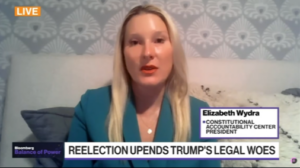November 2024 Newsletter: CAC’s Inaugural Scholar-in-Residence Advances New Scholarship on Reconstruction

This July, the Constitutional Accountability Center welcomed our inaugural Scholar-in-Residence, Alexis Hoag-Fordjour. Professor Hoag-Fordjour’s work at CAC focuses on the historical context of Reconstruction to provide a clarifying framework for interpreting rights in the present. Professor Hoag-Fordjour is just a few months into her year at CAC, but her work is already leading to exciting new scholarship and programming.
Professor Hoag-Fordjour’s scholarship focuses on interrogating criminal constitutional law and reimagining doctrine that could produce more just, equitable, and inclusive outcomes for defendants. Her article “Back to the Future: (Re)Constructing Ineffective Assistance of Counsel” was published last week in the UC Davis Law Review, and it uses a text-and-history approach to provide new tools for challenging constitutionally ineffective assistance of counsel. The current legal standard requires clients to show prejudice: they must prove that but for their attorney’s errors, the outcome of the proceeding would have been different. For many defendants, this is an insurmountable barrier, no matter how deficient their representation was. Professor Hoag-Fordjour writes that an ineffectiveness standard without a prejudice requirement is a better reflection of the Reconstruction Framers’ expansive vision of freedom and due process. As her paper explains, “Reconstruction provides a clarifying lens through which to reimagine all aspects of constitutional law, including the Sixth Amendment right to counsel.” Her groundbreaking research brings a new lens to an important issue in our criminal legal system and examines history with an eye to future litigation.
This December 4, CAC is hosting a virtual conversation about rediscovering the principles of Reconstruction in modern constitutional litigation. “Back to the Future: Embracing the Progressive Aims of the Constitution” will be a discussion featuring Professor Hoag-Fordjour and Professor Wilfred Codrington, who is the Walter Floersheimer Professor of Constitutional Law at Cardozo School of Law. CAC’s Vice President Praveen Fernandes will moderate the conversation. They will discuss the Constitution’s progressive ideals, rooted in Reconstruction and other social movements, and how these ideals apply to contemporary constitutional interpretation.
CAC’s scholarly work provides the deep historical support that makes our legal arguments possible, and it builds a narrative of the Constitution that is necessary to achieve lasting victories. We’re so excited to continue working with Professor Hoag-Fordjour to bring new life to the Reconstruction amendments and help realize the progressive promise of the whole Constitution.
![]()
- Properties of the Villages, Inc. v. FTC — The Eleventh Circuit is considering the legality of the Federal Trade Commission’s rule restricting the use of noncompete clauses. CAC filed a brief in support of the FTC, arguing that the requirements for applying the major questions doctrine are not satisfied in this case. Among other things, issuing rules like the FTC’s prohibition on noncompetes is not unprecedented and does not transform the authority Congress conferred on the FTC. Eleventh Circuit, filed November 8.
- Payan v. LA Community College District — The Ninth Circuit is considering whether lost educational opportunities experienced by blind students who were not given accessible materials are compensable under Title II of the Americans with Disabilities Act. Our brief demonstrates that the Supreme Court precedent on which the defendants rely does not prohibit courts from awarding damages for lost educational opportunities in cases brought under the ADA. Indeed, that case made clear that victims of discrimination can claim “those remedies traditionally available in suits for breach of contract,” and as our brief demonstrates, all foreseeable damages caused by the defendant’s breach, including damages for lost educational opportunities, are traditionally available in breach-of-contract actions. Ninth Circuit, filed November 8.
- Space Exploration Technologies Corp. v. NLRB — The Fifth Circuit is considering whether the leadership structure of the National Labor Relations Board is constitutional. CAC’s brief explains that recent Supreme Court precedent did not call into question the constitutionality of multimember independent agencies like the NLRB, and established practice places the validity of such agency structures beyond doubt. Fifth Circuit, filed November 4.
- Gonzales & Gonzales Bonds v. DHS — The Ninth Circuit considered whether the Secretary of Homeland Security may ratify regulations that were originally issued by an Acting Secretary who held the position unlawfully. In early October, the plaintiffs petitioned the Circuit to rehear the case en banc, and CAC filed an amicus brief in support. We explained that the original panel decision badly misconstrued the FVRA, departed from Supreme Court precedent, and weakened the safeguards of the Appointments Clause. At the end of the month, the Ninth Circuit denied the petition for rehearing. Ninth Circuit, filed October 10; decision rendered October 28.
- Seven County Infrastructure Coalition v. Eagle County — The Supreme Court is considering whether the National Environmental Policy Act requires federal agencies to study all the reasonably foreseeable environmental effects of proposed projects before approving them. Our brief argues, among other things, that the Council on Environmental Quality (the agency with authority to issue regulations interpreting NEPA) has interpreted NEPA to require agencies to consider reasonably foreseeable indirect effects since the statute was enacted, and this contemporaneous and consistent construction of NEPA is entitled to great weight under the Supreme Court’s recent decision in Loper Bright Enterprises v. Raimondo. Supreme Court, filed October 25.
- United States v. Idaho — In light of the Supreme Court’s decision last term to dismiss this case as improvidently granted, the Ninth Circuit is now reviewing the preliminary injunction of Idaho’s near-total abortion ban. Like the brief we filed in the Supreme Court last term, CAC’s brief on behalf of Members of Congress argues that the text and history of the Emergency Medical Treatment and Active Labor Act make clear that federal law mandates that hospitals offer abortion care when abortion constitutes the necessary stabilizing treatment for an individual’s “emergency medical condition,” and the brief again explains why EMTALA should be entitled to preemptive effect. Ninth Circuit, filed October 22.
- Villareal v. Alaniz — The Supreme Court granted the petition, vacated the Fifth Circuit’s decision, and remanded the case back to the lower court for further consideration in light of the Court’s decision in Gonzalez v. Trevino, a case from last term in which the Court clarified the threshold requirements individuals must satisfy to bring First Amendment claims against an official for arresting them in retaliation for their speech. Supreme Court, decision rendered October 15.
![]()

- November 8: joined Bloomberg TV to discuss the status of the federal cases against President-elect Trump and the future of the Supreme Court. “‘It is Basically Over:’ Wydra on Trump’s Legal Woes”
- November 19: CAC’s brief in MagnetSafety.org v. CPSC was mentioned in a Law360 article about the upcoming oral arguments in the case. “What’s On Deck At 10th Circ. Arguments in CPSC Magnet Case”
- November 15: CAC joined over 140 organizations in a letter urging the Senate to act quickly to confirm all pending judicial nominees. “Sign On Letter: 140+ National Organizations Urge Senators to Confirm All Pending Judicial Nominees”
- November 14: CAC Director of the Human Rights, Civil Rights, and Citizenship Program David Gans was quoted in Reuters discussing current Supreme Court cases and how the upcoming Trump administration might affect them. “Under Trump, US government legal stance poised to shift at Supreme Court”
- November 14: CAC Director of the Human Rights, Civil Rights, and Citizenship Program David Gans was quoted in an article in USA Today discussing the effects the upcoming Trump administration might have on cases currently on the Supreme Court’s docket. “Supreme Court whiplash: What Trump’s win means for guns and transgender care”
- November 9: CAC Chief Counsel Brianne Gorod was quoted in an article in NBC News discussing the role the Supreme Court will (or won’t) play as a potential check on Trump’s power in his next term as president. “Trump has shaped the Supreme Court, but it could still hinder his agenda”
- November 6: CAC President Elizabeth Wydra joined CBC to discuss the status of the cases against Trump and where they go after his victory in the election. “CAC’s Wydra Joins CBC to Discuss Trump’s Criminal Cases”
- November 4: CAC President Elizabeth Wydra appeared on CNN discussing the election. “Elizabeth Wydra Joins CNN to Discuss 2024 Election”
- October 31: CAC President Elizabeth Wydra appeared on Bloomberg TV to discuss the legal issues in the runup to the presidential election. “CAC’s Wydra Joins Bloomberg TV to Discuss Potential Legal Challenges in the 2024 Election”
- October 28: CAC’s brief in Seven County Infrastructure Coalition v. Eagle County was mentioned in a release from Earthjustice regarding the amici who filed in the case. “States, Members of Congress, Former Agency & CEQ Officials, Legal Experts, Local Communities File Amicus Briefs in Defense of NEPA in Supreme Court Oil Train Case”
- October 26: CAC Director of the Human Rights, Civil Rights, and Citizenship Program David Gans was quoted in an article in HuffPost about the election. “Mike Johnson Can’t Stop The House From Certifying The Election — But He Can Try”
- October 25: CAC Appellate Counsel Miriam Becker-Cohen was quoted in an article in Law360 on the flood of amici support in Seven County Infrastructure Coalition v. Eagle County. “NEPA Rail Ruling Backers Flood Justices With Amicus Briefs”
- October 23: CAC Counsel Nina Henry published an article in Washington Monthly about the Third Circuit cases on the constitutionality of the Medicare drug price negotiation program, explaining why the text and history of the Constitution refutes drug manufacturers’ arguments that the program runs afoul of the Takings Clause. “The Constitution Doesn’t Entitle Drug Manufacturers to a Sweetheart Deal”
- October 22: CAC’s brief on behalf of members of Congress in Idaho v. United States was discussed in an article in Bloomberg Law. “Lawmakers Urge Court to Uphold US’ Idaho Emergency Abortion Win”
- October 19: CAC President Elizabeth Wydra was quoted in an article in The Tablet discussing Justice Barrett’s record during her time on the Supreme Court thus far. “Barrett’s law”
![]()
YOUR Support Directly Enables CAC to Fulfill Our Progressive Constitutional Mission
CAC’s work helps defend the rule of law, advance economic justice, promote civil and human rights, and much more. In this critical year, will you support CAC with a gift of $50, $100, $500 or more to fulfill the Constitution’s progressive promise?

